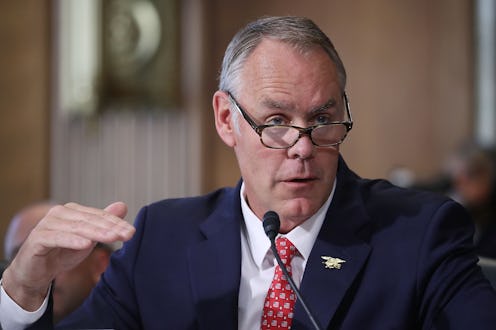News
A Trump Official Was Asked About Internment Camps & He Actually Tried Speaking Japanese

During a hearing for the House Committee on Natural Resources, Interior Secretary Ryan Zinke's greeting to Hawaiian Rep. Colleen Hanabusa surprised some observers. After Hanabusa asked Zinke about the Trump's administration plan to eliminate funding from a grant program about civil rights abuse against Japanese Americans during the World War II, a grinning Zinke said, "Oh, konnichiwa."
Hanabusa's heritage is Japanese and her grandparents were sent to Japanese internment camps during World War II. In case you didn't know, "konnichiwa" is a greeting in Japanese meant for the afternoon. In response to Zinke's peculiar greeting, a visibly unimpressed Hanabusa said, "I think it's still 'ohayo gozaimasu,' but that's OK." The term Hanabusa used is "good morning" in Japanese. "I guess it's after 10," a sheepish Zinke responded.
Zinke's quip becomes even more cringe-worthy if one actually reads what Hanabusa had said. "I sit before you, the granddaughter of two internees. Both of my grandfathers were interned during World War II. One in Santa Fe, New Mexico, and one in a place called Honouliuli in Hawaii, which people did not know about," she said, grilling Zinke about the fate of the Japanese American Confinement Sites (JACS) grant program.
If you want, you can watch the uncomfortable exchange in this video uploaded by the House Natural Resources Committee Democrats' YouTube account. It begins around the 10:04 mark.
During the hearing, Hanabusa asked Zinke to inform her about the status of the JACS program. The initiative is designed as a preservation program that studies, preserves, and interprets the time during which Japanese people were incarcerated during the World War II.
The purpose of the program, according to their website, is to "identify, research, evaluate, interpret, protect, restore, repair, and acquire historic confinement sites in order that present and future generations may learn and gain inspiration from these sites." Ultimately, the program's goal is to hold the United States committed to never repeating such policies again.
The JACS program's fate, however, is in limbo at the moment. In February, it became clear that under President Trump's 2019 budget, the program won't receive funding. "This president's budget zeroes out what is I think a really nominal amount to your whole budget. It's about $2 million," Hanabusa said.
The possibility of not receiving funding for the program has cause concern among its own members. Executive Director for JACS David Inoue told NBC News, "A lot of it goes into preserving the stories of people who were incarcerated, and a lot of those people are dying right now. So that’s why it’s imperative that we do keep funding going."
Inoue added, "There’s always the possibility that we could restart funding in a year if it’s cut this year, but the problem is how many possible people whose stories haven’t been preserved will have been lost in that one year?"
By eliminating funding for the program, Hanabusa said that Trump's budget threatened the purpose of programs like JACS. That's when Hanabusa asked if Zinke was committed to supporting it, and Zinke subsequently replied, "Oh, konnichiwa." On social media, people criticized Zinke while Alan He, a Capitol Hill reporter for CBS News, shared a photo of an audience member looking stunned by Zinke's response.
Politicians also took notice of Zinke's strange greeting for Hanabusa. Later on, on Thursday, California Democrat Rep. Judy Chu tweeted that Zinke should apologize.
"No better example of why we need continued support for historical sites where the rights of Japanese Americans were violated [because] of race. Zinke's comment betrayed a prejudice that being Asian makes you a perpetual foreigner," Chu tweeted. "Intentional or not, it's offensive. He should apologize."